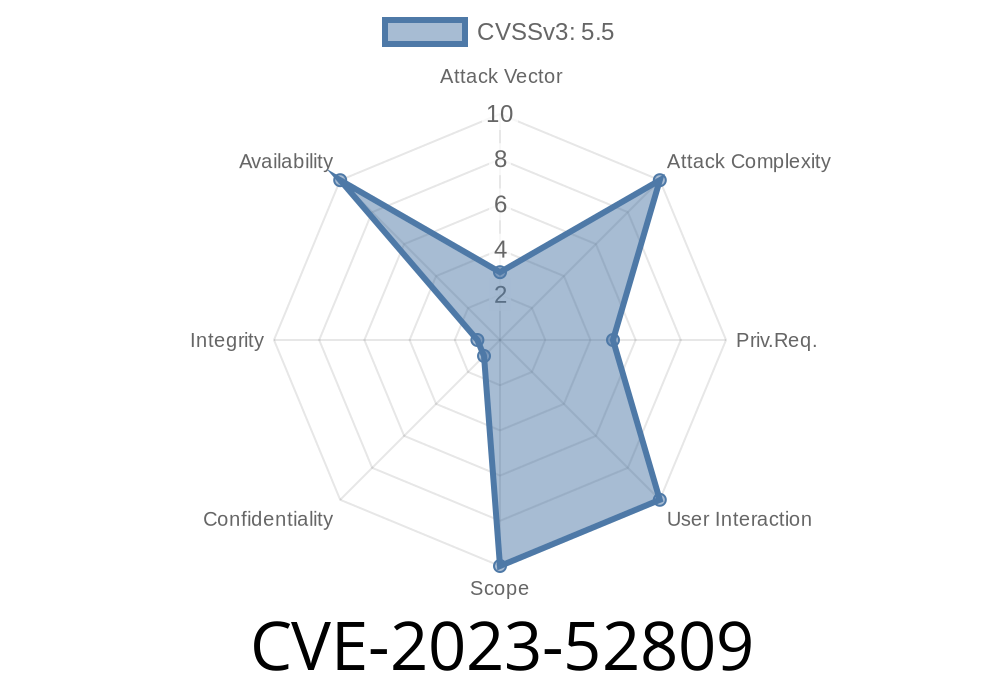CVE-2023-52809 is a medium-severity vulnerability discovered in the Linux kernel's SCSI stack, specifically in the Fibre Channel library (libfc). The problem lies in the fc_lport_ptp_setup() function, where a crucial check was missing. If an error occurred during the creation of a remote port (using fc_rport_create()), the code could end up dereferencing a NULL pointer — leading to a crash or even potential escalation of attacks.
In this article, I'll explain the bug in simple terms, show you the dangerous code, the patch, and how attackers might try to exploit this flaw. All the details here are curated for clarity — making this post one of the most accessible reads on CVE-2023-52809.
What Is the Problem?
Let's start with the basics. In Fibre Channel (FC) networking, various structures represent ports (endpoints). The function fc_lport_ptp_setup() is responsible for point-to-point link setup. To communicate, it tries to create a "remote port" — a small structure in memory — by calling this function:
struct fc_rport_priv *fc_rport_create(...);
But here's where the problem lies:
If fc_rport_create() fails for any reason (like running out of memory or other allocation errors), it returns NULL. If the caller doesn't check its return value, and tries to use the result, the system could crash (NULL pointer dereference), opening up security risks.
Here’s (simplified) what the vulnerable code looked like before the patch
struct fc_rport_priv *rdata;
rdata = fc_rport_create(...);
// Bug: No check if rdata == NULL!
rdata->some_member = something;
If fc_rport_create() returns NULL, the next line (rdata->some_member = ...) will crash the kernel.
Real-life snippet from libfc (see commit):
rdata = fc_rport_create(lport, DID_WWPN, FC_FID_FCP, -1, , NULL);
if (!rdata)
return;
rdata->ids.port_id = port_id;
...
But at some point, earlier code failed to insert this check, or later used rdata without checking — causing the bug.
How Was It Fixed?
The fix is straightforward: always check the return value of fc_rport_create(). If it returns NULL, log an error and don't use the invalid pointer.
Fixed code
struct fc_rport_priv *rdata;
rdata = fc_rport_create(...);
if (!rdata) {
pr_err("libfc: fc_rport_create() failed in %s\n", __func__);
return;
}
rdata->some_member = something; // Only safe now!
> See the patch commit on kernel.org for the real fix.
Why Is This Dangerous?
Dereferencing a NULL pointer in kernel space usually leads to a kernel panic (system crash), but in rare scenarios and special configurations, it could cause further security issues.
- Denial of Service (DoS): Any user or attacker capable of triggering this code path (for example, when setting up FC devices) could crash the system.
- Exploitation chance: This is less likely to be directly exploited for privilege escalation, but crashing services, interrupting operations, or causing instability are all possible.
(Linux kernel security researchers usually treat these bugs seriously, especially in widely deployed SCSI subsystems.)
Exploit Scenario (Hypothetical)
Suppose you’re running a SAN (Storage Area Network) with Fibre Channel on Linux. An attacker with low privileges might:
When fc_rport_create() fails, the kernel tries to access the invalid pointer — causing a crash.
This means a remote "nuisance" or even an insider threat could render critical storage nodes offline until rebooted.
References
- CVE-2023-52809 at NVD
- Original kernel fix commit
- Linux kernel stable release changelogs
Audit your Fibre Channel and SCSI device usage; restrict device access where possible.
- Monitor kernel logs (dmesg or /var/log/kern.log) for errors about fc_rport_create().
Conclusion
CVE-2023-52809 is another example of why simple NULL checks in low-level code matter—a single missing validation could take down enterprise servers. The fix is easy, but the consequences could have been costly.
If you run Linux with SCSI/Fibre Channel, make sure you’re up to date!
Timeline
Published on: 05/21/2024 16:15:19 UTC
Last modified on: 05/24/2024 01:14:23 UTC
